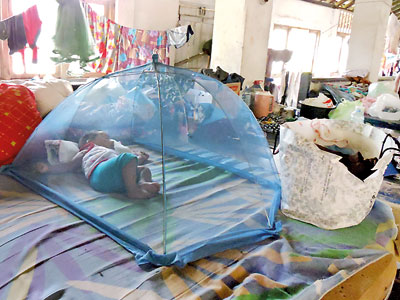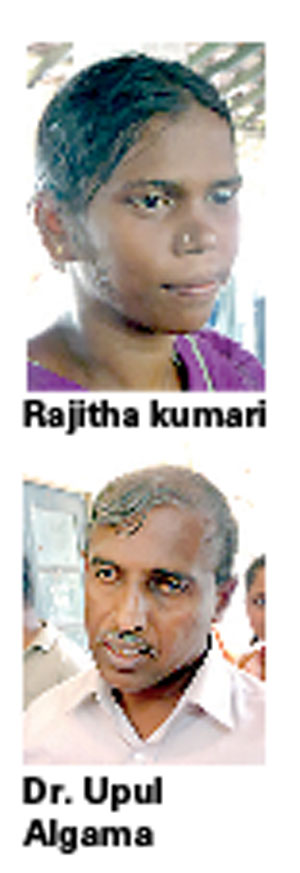News
Officials moving fast to head off threat of plagues

An infant in a camp. Pix by Athula Devapriya
This week’s rains and flash floods have raised fresh concerns about an outbreak of water-borne diseases among the hundreds of thousands of displaced people.
To meet this emergency and neutralise epidemic the outbreaks of cholera, dysentery, rat fever, allergies and food poisoning that generally follow massive floods the Health Ministry has moved in with counter-measures.
Health Ministry Epidemiology Unit chief Paba Palihawadana said the ministry has deployed public health inspectors, nurses and medical officers of health to camps where the flood-affected people have taken refuge.
Mobile clinics are being conducted in all schools, community halls and temples where people have taken refuge. People with health issues are being checked and are being treated in the camps. “The mobile clinics have also been sufficiently stocked with medications to treat patients showing symptoms of any of the diseases,” she said.
In addition, the most vulnerable group – pregnant women and children – are being closely monitored for any disease symptoms.
At the Vidyalankara Pirivenna camp, where about 400 people have taken refuge, pregnant women said they were receiving good care.
Radhika Kumara, 23, who is in her eight month of pregnancy and expecting her second child, said that she has been in the centre since day one when flash floods filled their homes neck-deep. “We cannot go back and all our belongings have been washed away,” she said.
She said the centre and the mobile clinics were giving them excellent care.
Pushpa Wijekumar, 24, and Kavitha, 35, who are also pregnant, confirmed this, saying they and their children were being looked after well by visiting doctors.
Concerns have been raised over the conditions in which food is being cooked for the displaced people. Dr. Palihawadana warned that the water used for cooking and drinking could be contaminated and said it was best that water is boiled before consumption.
People in the camps said that there was no way that they could boil water as they depended entirely on outside help for their food and water.
The camps are being managed by the grama sevaka niladhari, development officer, samurdhi officer and an area police officer.
Meanwhile Ayurvedic Community Officers of the area also on standby to offer their services. Dr. Upul Algama and Dr. Lal Wijesinghe said that they have been called in to provide counselling to those suffering trauma.
“Neural diseases and stress can be treated by us together with psychotherapy,” Dr. Algama said.
Many of the families had refused to move out of their homes for fear of losing their belongings. I.D. Senelatha, 62, whose 17-year-old daughter suffers from disability and is wheelchair-bound, said her house had been burgled while she was in the camp. “When I go back, I will have nothing,” she said.
Gramaseveka Niladhari Erbert Fernando said that although there were only around 400 persons in the shelter the authorities had to provide food for around 800 persons as some people were staying outside to guard their homes. “They are refusing to come as they are guarding their belongings,” he said.
The pirivenna has around five toilets. Although the crowd is managing with this facility there was a constant need to clean the toilets because of the numbers using them.
The Colombo Municipal (CMC) Council said preparations are being made to have clogged drains and toilets in the homes of the displaced people cleaned up. “Once the water recedes we will start on this work,” CMC Commissioner B.K. Anura said. “All leave for the CMC workers have been cancelled,” he added.
CMC Chief Medical Officer Ruwan Wijemuni said he was worried about rat fever spreading again in the city. “We are slowly containing the problem and with the floods it might raise its head again,” he said.
On the issue of hygiene in food preparation, Dr. Wijemuni said the catering contracts had been awarded to established kitchens cleared by the Assistant Government Agent’s office. “The PHIs are checking the kitchens with regards to cleanliness,” he said.
He said the availability of toilets was a problem and that the CMC had requested 12 mobile toilets for the camps to be delivered this weekend.
In the mayhem, dengue mosquitoes are not forgotten: the camps are being frequently fumigated to ward off the mosquitoes.

